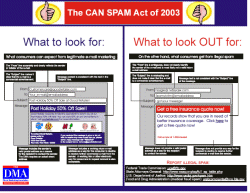Posted by Virus Bulletin on Jan 15, 2004
DMA releases quick-glance reference guide for email marketers.
The Direct Marketing Association (DMA) has released a quick-glance reference guide for marketers entitled 'The CAN SPAM Act of 2003: What to Look For, What to Look OUT For'. 
The single-page guide provides graphical illustrations to contrast between a legitimate marketing email that complies with the law ('What to look for') and an illegal spam email that does not ('What to look OUT for').
[Unfortunately, to the eyes of one who receives an overwhelming volume of spam on a daily basis (and who doesn't?), both examples look equally offensive - Ed.]
In addition, the DMA is running a series of briefings this month to bring its members up to speed on how to comply with the new federal anti-spam legislation and on 'how to proceed into an uncertain future'. See http://www.the-dma.org/.
Posted on 15 January 2004 by Virus Bulletin